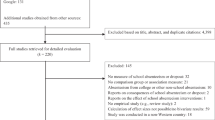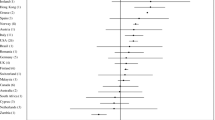Abstract
The psychosocial correlates and consequences of peer victimization are well documented. However, there is limited knowledge about whether different forms of peer victimization (relational and physical) are predictive of school-based social and motivational factors among adolescents from non-Western cultures. The present study examined the relationship between individual and school-level forms of peer victimization and school adjustment among Japanese adolescents, and the mediating role that these factors may play. The Japanese sample (N = 6109 from 185 schools, Mage = 15.78, SD = 0.29, 51% girls and 49% boys) was drawn from a large international dataset, the Organization for Economic Cooperation and Development (OECD) Programme for International Student Assessment (PISA) 2018. Results showed that school-level relational victimization was associated with individual-level relational victimization, and school-level physical victimization was associated with individual-level physical victimization, after controlling for age, gender, and socioeconomic status. Individual-level relational victimization was also uniquely associated with indices of school adjustment (negative affect, positive affect, and fear of failure) over and above physical victimization. While controlling for relational victimization, individual-level physical victimization was associated with indices of school adjustment (positive affect and meaning in life). In further findings, school-level relational and physical victimization were indirectly, but not directly, related to some of students’ school adjustment through individual-level relational and physical victimization. These parallel and differential associations suggest the importance of considering the role of relational and physical victimization in school adjustment among Japanese adolescents.

Similar content being viewed by others
References
Adrian, M., Jenness, J. L., Kuehn, K. S., Smith, M. R., & McLaughlin, K. A. (2019). Emotion regulation processes linking peer victimization to anxiety and depression symptoms in adolescence. Development and Psychopathology, 31(3), 999–1009. https://doi.org/10.1017/S0954579419000543.
Bandura, A. (1977a). Social learning theory. Englewood Cliffs, NJ: Prentice-Hall.
Bandura, A. (1977b). Self-efficacy: Toward a unifying theory of behavioral change. Psychological Review, 84(2), 191–215. https://doi.org/10.1037/0033-295X.84.2.191.
Casper, D. M., & Card, N. A. (2017). Overt and relational victimization: A meta-analytic review of their overlap and associations with social-psychological adjustment. Child Development, 88(2), 466–483. https://doi.org/10.1111/cdev.12621.
Cho, D., Zatto, B. R. L., & Hoglund, W. L. G. (2022). Forms of peer victimization in adolescence: Covariation with symptoms of depression. Developmental Psychology, 58(2), 392–404. https://doi.org/10.1037/dev0001300.
Dahl, R. E., Allen, N. B., Wilbrecht, L., & Suleiman, A. B. (2018). Importance of investing in adolescence from a developmental science perspective. Nature, 554, 441–450. https://doi.org/10.1038/nature25770.
Dishion, T. J., & Tipsord, J. M. (2011). Peer contagion in child and adolescent social and emotional development. Annual Review of Psychology, 62, 189–214. https://doi.org/10.1146/annurev.psych.093008.100412.
Eccles, J. S., & Roeser, R. W. (2011). Schools as developmental contexts during adolescence. Journal of Research on Adolescence, 21(1), 225–241. https://doi.org/10.1111/j.1532-7795.2010.00725.x.
Glaw, X., Kable, A., Hazelton, M., & Inder, K. (2017). Meaning in life and meaning of life in mental health care: An integrative literature review. Issues in Mental Health Nursing, 38(3), 243–252. https://doi.org/10.1080/01612840.2016.1253804.
Henry, K. L., Lovegrove, P. J., Steger, M. F., Chen, P. Y., Cigularov, K. P., & Tomazic, R. G. (2014). The potential role of meaning in life in the relationship between bullying victimization and suicidal ideation. Journal of Youth and Adolescence, 43, 221–232. https://doi.org/10.1007/s10964-013-9960-2.
Hong, J. S., & Espelage, D. L. (2012). A review of research on bullying and peer victimization in school: An ecological system analysis. Aggression and Violent Behavior, 17(4), 311–322. https://doi.org/10.1016/j.avb.2012.03.003.
Idsoe, T., Vaillancourt, T., Dyregrov, A., Hagen, K. A., Ogden, T., & Nærde, A. (2021). Bullying victimization and trauma. Frontiers in Psychiatry, 11, 480353. https://doi.org/10.3389/fpsyt.2020.480353.
Kawabata, Y. (2018). Cultural contexts of relational aggression. In S. M. Coyne & J. M. Ostrov (Eds.), The development of relational aggression (pp. 265–280). Oxford University Press. https://doi.org/10.1093/oso/9780190491826.003.0017
Kawabata, Y., Kinoshita, M., & Onishi, A. (2024). A longitudinal study of forms of peer victimization and internalizing problems in adolescence. Research on Child and Adolescent Psychopathology. Advance online publication. https://doi.org/10.1007/s10802-023-01155-9
Kawabata, Y., & Onishi, A. (2017). Moderating effects of relational interdependence on the association between peer victimization and depressive symptoms. Child Psychiatry & Human Development, 48(2), 214–224. https://doi.org/10.1007/s10578-016-0634-7.
Kokkinos, C. M., & Kipritsi, E. (2012). The relationship between bullying, victimization, trait emotional intelligence, self-efficacy and empathy among preadolescents. Social Psychology of Education, 15, 41–58. https://doi.org/10.1007/s11218-011-9168-9.
Kuppens, S., Grietens, H., Onghena, P., Michiels, D., & Subramanian, S. V. (2008). Individual and classroom variables associated with relational aggression in elementary-school aged children: A multilevel analysis. Journal of School Psychology, 46(6), 639–660. https://doi.org/10.1016/j.jsp.2008.06.005.
Kurokawa, M., & Yoshida, T. (2009). The effects of peer presence and personal permeability of the group on learning within the group. Japanese Journal of Experimental Social Psychology, 49(1), 45–57. https://doi.org/10.2130/jjesp.49.45.
Laith, R., & Vaillancourt, T. (2022). The temporal sequence of bullying victimization, academic achievement, and school attendance: A review of the literature. Aggression and Violent Behavior, 64, 101722. https://doi.org/10.1016/j.avb.2022.101722.
Long, Y., Zhou, H., & Li, Y. (2020). Relational victimization and internalizing problems: Moderation of popularity and mediation of popularity status insecurity. Journal of youth and adolescence, 49, 724–734. https://doi.org/10.1007/s10964-019-01177-x.
Martela, F., & Steger, M. F. (2016). The three meanings of meaning in life: Distinguishing coherence, purpose, and significance. The Journal of Positive Psychology, 11(5), 531–545. https://doi.org/10.1080/17439760.2015.1137623.
McLaughlin, K. A., Hatzenbuehler, M. L., & Hilt, L. M. (2009). Emotion dysregulation as a mechanism linking peer victimization to internalizing symptoms in adolescents. Journal of Consulting and Clinical Psychology, 77(5), 894–904. https://doi.org/10.1037/a0015760.
Mercer, S. H., McMillen, J. S., & DeRosier, M. E. (2009). Predicting change in children’s aggression and victimization using classroom-level descriptive norms of aggression and pro-social behavior. Journal of School Psychology, 47(4), 267–289. https://doi.org/10.1016/j.jsp.2009.04.001.
Moore, S. E., Norman, R. E., Suetani, S., Thomas, H. J., Sly, P. D., & Scott, J. G. (2017). Consequences of bullying victimization in childhood and adolescence: A systematic review and meta-analysis. World journal of psychiatry, 7(1), 60–76. https://doi.org/10.5498/wjp.v7.i1.60.
Murray-Close, D., Nelson, D. A., Ostrov, J. M., Casas, J. F., & Crick, N. R. (2016). Relational aggression: A developmental psychopathology perspective. In D. Cicchetti (Ed.), Developmental psychopathology: Risk, resilience, and intervention (3rd ed., pp. 660–722). John Wiley & Sons, Inc. https://doi.org/10.1002/9781119125556.devpsy413
Muthén, L. K., & Muthén, B. O. (1998). Mplus User’s Guide. Eighth Edition. Los Angeles, CA: Muthén & Muthén. 2017.
Organisation for Economic Co-operation and Development (OECD). (n.d.). PISA 2018 Database. https://www.oecd.org/pisa/data/2018database.
Organisation for Economic Co-operation and Development (OECD). (2011). Strong performers and successful reformers in education: Lessons from PISA for the United States. https://www.oecd.org/pisa/46623978.pdf.
Organisation for Economic Co-operation and Development (OECD). (2019a). PISA 2018 Technical Report. Paris: OECD Publishing. https://www.oecd.org/pisa/data/pisa2018technicalreport/.
Organisation for Economic Co-operation and Development (OECD). (2019b). PISA 2018: Insights and Interpretations. https://www.oecd.org/pisa/PISA%202018%20Insights%20and%20Interpretations%20FINAL%20PDF.pdf.
Ostrov, J. M., & Kamper, K. E. (2015). Future directions for research on the development of relational and physical peer victimization. Journal of Clinical Child and Adolescent Psychology, 44(3), 509–519. https://doi.org/10.1080/15374416.2015.1012723.
Osuka, Y., Nishimura, T., Wakuta, M., Takei, N., & Tsuchiya, K. J. (2019). Reliability and validity of the Japan Ijime Scale and estimated prevalence of bullying among fourth through ninth graders: A large-scale school-based survey. Psychiatry and Clinical Neurosciences, 73(9), 551–559. https://doi.org/10.1111/pcn.12864.
Piotrowska, P. J., Stride, C. B., Croft, S. E., & Rowe, R. (2015). Socioeconomic status and antisocial behaviour among children and adolescents: A systematic review and meta-analysis. Clinical Psychology Review, 35, 47–55. https://doi.org/10.1016/j.cpr.2014.11.003.
Pouwels, J. L., Souren, P. M., Lansu, T. A. M., & Cillessen, A. H. N. (2016). Stability of peer victimization: A meta-analysis of longitudinal research. Developmental Review, 40, 1–24. https://doi.org/10.1016/j.dr.2016.01.001.
Preacher, K. J., Zyphur, M. J., & Zhang, Z. (2010). A general multilevel SEM framework for assessing multilevel mediation. Psychological Methods, 15(3), 209–233. https://doi.org/10.1037/a0020141.
Prinstein, M. J., Boergers, J., & Vernberg, E. M. (2001). Overt and relational aggression in adolescents: Social–psychological adjustment of aggressors and victims. Journal of Clinical Child and Adolescent Psychology, 30(4), 479–491. https://doi.org/10.1207/S15374424JCCP3004_05.
Rivers, I., Poteat, V. P., Noret, N., & Ashurst, N. (2009). Observing bullying at school: The mental health implications of witness status. School Psychology Quarterly, 24(4), 211–223. https://doi.org/10.1037/a0018164.
Rohlf, H., Krahé, B., & Busching, R. (2016). The socializing effect of classroom aggression on the development of aggression and social rejection: A two-wave multilevel analysis. Journal of School Psychology, 58, 57–72. https://doi.org/10.1016/j.jsp.2016.05.002.
Schippers, M. C., & Ziegler, N. (2019). Life crafting as a way to find purpose and meaning in life. Frontiers in Psychology, 10, 2778. https://doi.org/10.3389/fpsyg.2019.02778.
Steger, M. F., Frazier, P., Oishi, S., & Kaler, M. (2006). The meaning in life questionnaire: Assessing the presence of and search for meaning in life. Journal of Counseling Psychology, 53(1), 80–93. https://doi.org/10.1037/0022-0167.53.1.80.
Steger, M. F., O’Donnell, M. B., & Morse, J. L. (2021). Hel** students find their way to meaning: Meaning and purpose in education. The Palgrave handbook of positive education (pp. 551–579). Cham: Springer International Publishing.
Sugimura, K. (2020). Adolescent identity development in Japan. Child Development Perspectives, 14(2), 71–77. https://doi.org/10.1111/cdep.12359.
Toda, Y. (2019). Ijime prevention programs in Japan. In P. K. Smith (Ed.), Making an impact on school bullying: Interventions and recommendations (pp. 132–153). London and New York: Routledge.
van Geel, M., Goemans, A., Zwaanswijk, W., Gini, G., & Vedder, P. (2018). Does peer victimization predict low self-esteem, or does low self-esteem predict peer victimization? Meta-analyses on longitudinal studies. Developmental Review, 49, 31–40. https://doi.org/10.1016/j.dr.2018.07.001.
Zimmer-Gembeck, M. J. (2016). Peer rejection, victimization, and relational self-system processes in adolescence: Toward a transactional model of stress, co**, and develo** sensitivities. Child Development Perspectives, 10(2), 122–127. https://doi.org/10.1111/cdep.12174.
Data Sharing and Declaration
The data are publicly available at https://www.oecd.org/pisa/data/2018database.
Author information
Authors and Affiliations
Corresponding author
Ethics declarations
Conflict of Interest
The author declares no competing interests.
Ethical Approval
Secondary data were used to prepare this manuscript. No human subjects were recruited or consented to participate in this study. The institutional review board of the author’s university approved this study with full review. This study used publicly available data. As a secondary data analysis, this study was approved by the author’s university.
Additional information
Publisher’s note Springer Nature remains neutral with regard to jurisdictional claims in published maps and institutional affiliations.
Supplementary information
Rights and permissions
Springer Nature or its licensor (e.g. a society or other partner) holds exclusive rights to this article under a publishing agreement with the author(s) or other rightsholder(s); author self-archiving of the accepted manuscript version of this article is solely governed by the terms of such publishing agreement and applicable law.
About this article
Cite this article
Kawabata, Y. Forms of Peer Victimization and School Adjustment Among Japanese Adolescents: A Multilevel Analysis. J. Youth Adolescence 53, 1441–1453 (2024). https://doi.org/10.1007/s10964-024-01967-y
Received:
Accepted:
Published:
Issue Date:
DOI: https://doi.org/10.1007/s10964-024-01967-y




